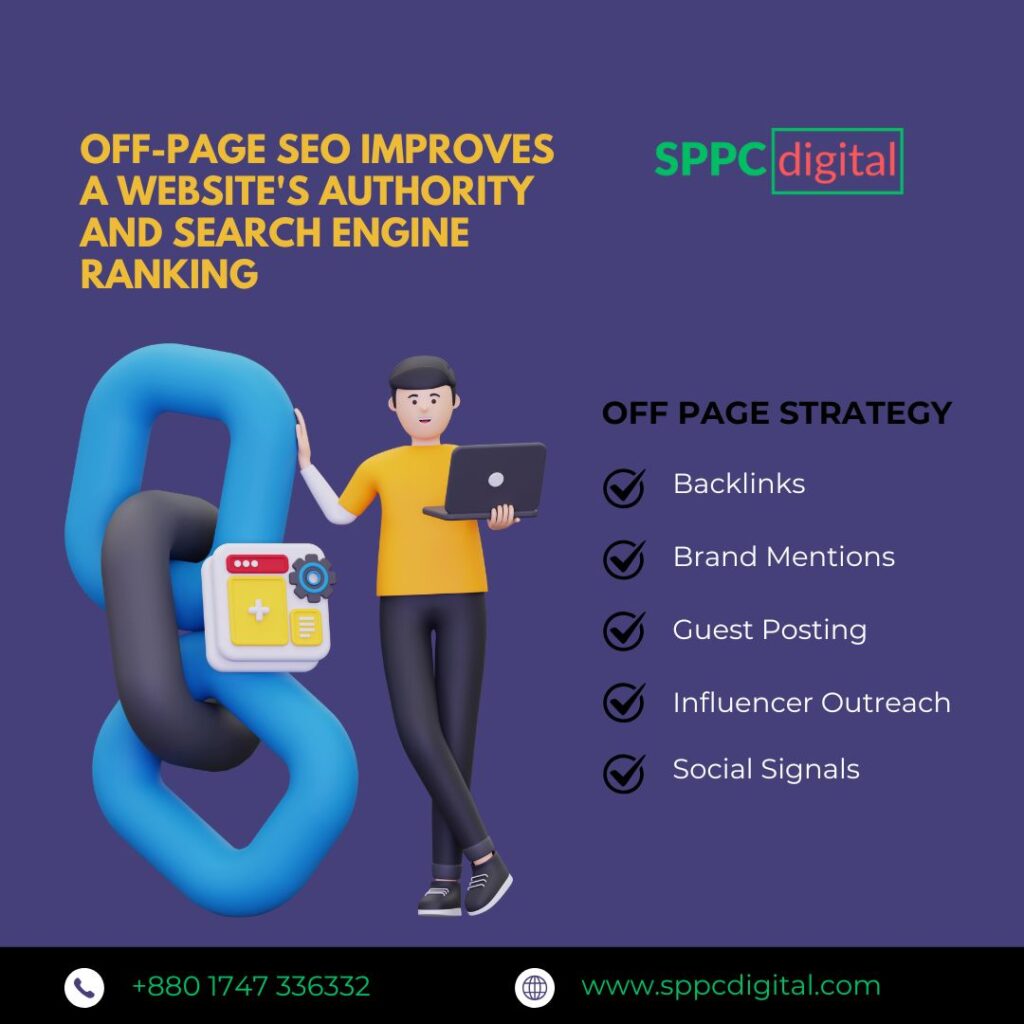Learn, How does Off-page SEO improve a website’s authority by building quality backlinks, increasing brand mentions, and enhancing online credibility for better search engine rankings and increased organic traffic by focusing on actions taken outside the site. These strategies are designed to build credibility, trust, and relevance from external sources, which search engines view as a vote of confidence in your content. Here’s a breakdown of key off-page SEO tactics and how they contribute to boosting your website’s authority and search engine position:
1. Backlinks

– High-Quality Backlinks: Backlinks, especially from authoritative and reputable websites, are a primary off-page SEO signal. Google views these links as endorsements, suggesting your content is trustworthy and valuable. High-quality backlinks increase your website’s Domain Authority (DA), a metric search engines use to rank sites.
– Diversity and Relevance: Links from diverse sources, such as industry blogs, news sites, and resource pages, reinforce authority. Relevant backlinks (from sites in similar or related fields) are especially impactful, as they show that others trust your website in the same niche.
Best Practices: Aim to earn backlinks from websites with high DA. Tools like Ahrefs or SEMrush can help you identify high-authority sites in your field and track your backlink progress.
2. Brand Mentions

– Unlinked Brand Mentions: Even when a website doesn’t link directly to you, a mention of your brand name can still impact SEO. Search engines can interpret unlinked brand mentions as signs of brand awareness and authority, which influence ranking.
– Building a Presence: Building a recognizable brand through mentions on other platforms, forums, and social media can help your site stand out and increase trust with search engines.
Best Practices: Engage with media, blogs, and online forums where your brand could be mentioned. Google Alerts is a helpful tool for tracking mentions across the web.
3. Social Signals
– Indirect Influence on Rankings: While social media activity (likes, shares, comments) doesn’t directly affect Google rankings, it contributes to brand visibility and drives traffic, which can lead to more backlinks and brand mentions.
– Boosting Engagement: A strong social media presence enhances your brand’s reputation, which may indirectly help search engines see your website as credible. Higher engagement rates signal user interest and quality, leading to more organic visits.
Best Practices: Consistently share valuable content on social platforms to increase reach, build engagement, and improve the chances of people linking to your content.
4. Guest Posting | How does Off-Page SEO improve a website’s authority

– Authority and Exposure: Writing guest posts for well-established sites helps you reach a larger audience and gain credibility. Guest posts often include backlinks to your website, This is how does the Off-Page SEO improve a website’s authority.
– Building Expertise: Contributing high-quality content on relevant websites positions your brand as an industry leader, building trust with both users and search engines.
Best Practices: Target reputable sites in your industry that accept guest posts, ensuring that your content aligns with their audience and includes natural backlinks to your site.
5. Influencer Outreach
– Amplified Reach and Authority: Partnering with influencers helps you reach a broader audience and establish credibility in your niche. Influencers with a large following can drive traffic to your site, increase mentions, and potentially earn you backlinks.
– Trust and Loyalty: When influencers endorse your content, it lends credibility to your brand and can improve users’ trust in your business. This authority can lead to positive SEO signals.
Best Practices: Identify influencers whose audiences align with your target market and establish mutually beneficial partnerships. Ensure that influencers provide genuine recommendations to build trust authentically.
Benefits of Off-Page SEO
– Improves site Authority: By earning high-quality backlinks, mentions, and social engagement, you signal to search engines that your website is reliable and valuable.
– Enhances Visibility: Off-page strategies like social media sharing, guest blogging, and influencer outreach increase your brand’s visibility, bringing more traffic to your site.
– Boosts Rankings: With improved authority, your website is more likely to rank higher for relevant keywords, increasing the likelihood of organic traffic growth.
In conclusion, off-page SEO enhances a website’s authority, visibility, and ranking through backlinks, brand mentions, social signals, guest posting, and influencer partnerships. By focusing on these external factors, your website becomes more trustworthy to search engines, ultimately improving its ranking and attracting more organic traffic. Incorporating off-page SEO is an essential part of building authority and improving search rankings, with benefits that contribute to a website’s long-term success.
FAQ on How does Off-Page SEO improve a website’s authority
What is off-page SEO?
Off-page SEO refers to actions taken outside of your website to impact your rankings within search engine results pages (SERPs). This includes building backlinks, brand mentions, social media engagement, and influencer outreach, all of which signal credibility and authority to search engines.
Why are backlinks important in off-page SEO
Backlinks from high-authority sites are crucial because they act as endorsements for your content. When reputable sites link to your website, it tells search engines that your content is valuable and trustworthy, which improves your domain authority and rankings.
How do social signals influence SEO?
Social signals (likes, shares, comments) don’t directly impact rankings, but they increase brand visibility and drive traffic to your website. This heightened awareness can lead to more backlinks, mentions, and engagement, indirectly supporting SEO efforts.
How does guest posting help with off-page SEO?
Guest posting allows you to publish content on authoritative websites, helping you reach a broader audience while building backlinks to your site. This practice enhances your brand’s authority and establishes you as a credible source in your industry.
What are brand mentions, and why are they important?
Brand mentions are references to your brand name on other sites, with or without a link. Search engines consider mentions as a sign of brand awareness and authority. Consistent mentions can positively impact your SEO by reinforcing your brand’s credibility.
Is influencer marketing beneficial for off-page SEO?
Yes, influencer marketing is beneficial as it increases brand exposure, encourages engagement, and can lead to backlinks from trusted sources. Influencers promoting or linking to your content boost credibility and visibility, indirectly aiding SEO.
How can I measure the success of my off-page SEO efforts?
Use tools like Google Analytics and SEO software (Ahrefs, SEMrush) to track metrics such as backlinks, referral traffic, social shares, and brand mentions. Monitoring Domain Authority (DA) and organic ranking improvements also help measure success.
How long does it take to see results from off-page SEO?
Results from off-page SEO take time and can vary. Generally, you may start seeing improvements within 3 to 6 months, but significant ranking changes may take up to a year or more, depending on the competitiveness of your industry and the consistency of your efforts.



